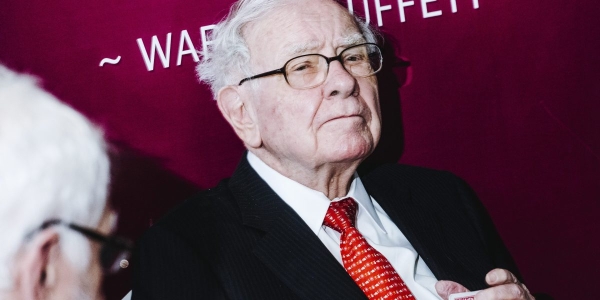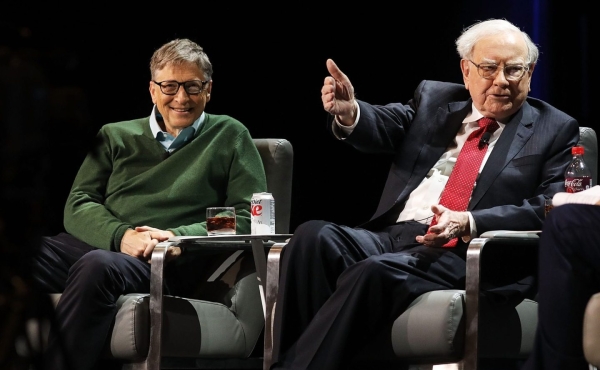
When Warren Buffett, one of the most well-respected investors on the planet, speaks (or writes), people pay attention. And since the 92-year-old CEO of Berkshire Hathaway rarely has time for interviews these days, his annual letter to the shareholders of his mega conglomerate is a big event on Wall Street.
Known for his love of teaching, Buffett typically uses his letter not only to discuss Berkshire’s performance, but also to advise younger investors, break down key themes in markets, and sometimes criticize the misbehavior of CEOs. This year’s letter was no different, as the nonagenarian began the 11-page brief with a brief monologue on changing attitudes about saving and generational wealth.
In the past, he wrote, the conventional wisdom was that people saved money in order to “maintain their living standards after retirement,” and any extra money was then left to family and friends. But these days, Buffett claimed a new trend has emerged, and he put Berkshire Hathaway investors at the forefront of it. In short, he’s proud of how philanthropic he and his investors have become.
“Our experience has differed. We believe Berkshire’s individual holders largely to be of the once-a-saver, always-a-saver variety. Though these people live well, they eventually dispense most of their funds to philanthropic organizations,” he wrote.
Buffett said that his goal at Berkshire is to enrich these “dedicated savers,” who, in turn, will give the majority of their wealth to charity upon their death. These investors aren’t interested in “dynasty building” like many of their predecessors, or fancy “look-at-me assets” like cars and jewelry. Instead, their goal is to build wealth and live well, according to Buffett.
Monkey see, monkey do?
Berkshire Hathaway investors seem to be following in Buffett’s footsteps when it comes to their views on generational wealth and philanthropy. In 2006, Buffett decided that he would “gradually” give away all of his Berkshire Hathaway stock—which makes up the bulk of his $106 billion net worth—forgoing building a dynasty by giving the funds to his children.


Photo by Spencer Platt/Getty Images
Then, in 2010, Buffett started the Giving Pledge with Microsoft cofounder Bill Gates, promising to donate 99% of his wealth sometime during his life of “at death.” His goal was to persuade his fellow billionaires to follow suit, and so far, more than 120 have agreed to the cause.
Now Buffett’s loyal following at Berkshire appear to be joining the giving trend—and the billionaire is pleased with the results. “The disposition of money unmasks humans,” he wrote. “Who wouldn’t enjoy working for shareholders like ours?”
But it’s not just Berkshire investors who are changing their minds on “dynasty building.” As life expectancy and the desire to leave a charitable legacy increases, passing wealth onto the next generation is going out of style.
Some $84 trillion could pass from baby boomers to Generation X and millennials over the next decade, according to data from the market research firm Cerulli Associates. But of that, some $12 trillion is already headed to philanthropy. And just 37% of wealthy U.S. adults have a plan in place to transfer their wealth to their families, according to Jason Van de Loo, head of wealth planning and marketing at Edelman Financial Engines.
“As parents, we are struggling with how to support our kids,” he told CNBC in December, adding that there is a growing “I earned this and so should you” mindset among baby boomers. This may be cold comfort to their children, who largely comprise the millennial generation, given that the New York Federal Reserve just found a historic $3.8 trillion in debt has been accumulated by thirtysomething members of that generation as student loans pile up. And with the historic surge in home prices, both millennials and Gen Z are far less likely to own a home than their parents were at the same age.
Notes from Warren Buffett’s annual letter
Beyond lauding Berkshire Hathaway investors’ frugal attitudes and willingness to give to charity, Buffett’s latest shareholder letter contained some fascinating tidbits about markets and the economy.
Despite stubborn inflation and rising interest rates, the billionaire struck an optimistic tone in the letter, contending that even amid recession fears, betting against the American economy is never a good idea.
“I have been investing for 80 years—more than one-third of our country’s lifetime. Despite our citizens’ penchant—almost enthusiasm—for self-criticism and self-doubt, I have yet to see a time when it made sense to make a long-term bet against America,” he wrote. “And I doubt very much that any reader of this letter will have a different experience in the future.”
But the Berkshire CEO also offered “an important warning” to American executives, arguing that some are manipulating financial results to impress analysts, which could lead to serious problems for investors.
“That activity is disgusting. It requires no talent to manipulate numbers: Only a deep desire to deceive is required. ‘Bold imaginative accounting,’ as a CEO once described his deception to me, has become one of the shames of capitalism,” he wrote.
In a bit of retrospective analysis, Buffett then called himself a “so-so” manager, contending that his “satisfactory results” since 1965 have largely been the result of a dozen or so great investments in companies like Coca-Cola and American Express.
“In 58 years of Berkshire management, most of my capital-allocation decisions have been no better than so-so,” he said. “In some cases, also, bad moves by me have been rescued by very large doses of luck.”
Buffett said the lesson for investors within his mistakes is simple: It only takes a few winning investments to “work wonders.”
“The weeds wither away in significance as the flowers bloom,” he said. “And, yes, it helps to start early and live into your 90s as well.”
